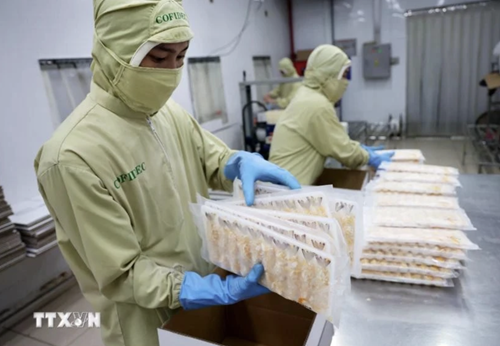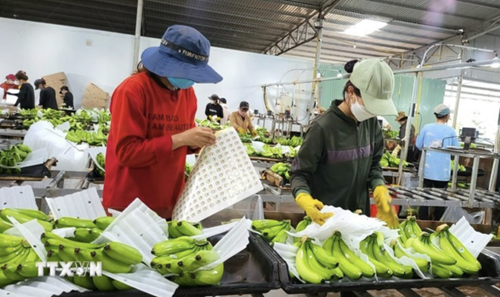Vietnam's trade surplus with the U.S. reached 123.5 billion USD. As the American country implements various import tariff measures against certain countries, Vietnamese businesses must remain vigilant and prepared for potential impacts, insiders said.
    |
 |
|
Shrimp packaged for exports |
According to Chairman of Intimex group Do Ha Nam, the enterprise’s key agricultural products, including pepper, cashews and coffee, are not subject to the U.S. import tariffs as the country does not produce these items domestically. The exemption, therefore, allows Intimex to maintain its market share and continue exporting to the U.S.
Beyond pepper and cashew, Intimex stands as Vietnam's largest exporter of coffee beans to the U.S. The company also imports thousands of tons of frozen foods like chicken and beef from the market. In 2024 alone, Intimex's trade with the U.S. exceeded 100 million USD.
However, Nam worried that the U.S. trade remedy instruments could reduce reliance on foreign suppliers, while decreasing U.S. consumers’ demand due to rising prices. This would affect the demand for coffee and other agricultural products, including those supplied by Intimex.
Besides, new import tariffs from the U.S. could potentially disrupt global supply chains and even spark trade wars between nations, he stressed.
Currently, the U.S. is the biggest buyer of Vietnamese pepper, accounting for 29% of the market share. Last year, Vietnam's pepper industry exported a record high of over 73,000 tons to the U.S. and gained nearly 400 million USD in revenue, rising by 33% in volume as compared to the previous year.
Chairwoman of the Vietnam Pepper and Spice Association Hoang Thi Lien held that if the U.S. measures take effect, they will directly impact Vietnamese pepper and spices’ export prices, potentially causing substitution by alternative suppliers and reducing competitiveness in the market.
Although challenges are forecast for the sector this year, Lien said given the distinctive qualities of Vietnamese pepper, the U.S. may initially impose technical barriers rather than direct tariffs.
In the same vein, Chairman of Phuc Sinh Corporation Phan Minh Thung, said his company ships more than 60,000 tons of coffee and 30,000 tons of pepper annually. Rather than selling raw materials, the business promotes deep processing to create higher-value products.
Boasting over 20,000 hectares of Rainforest Alliance-certified coffee plantations and 100% of exported pepper meeting international standards, the company is prepared to meet stringent requirements from both the U.S. and European markets.
Phuc Sinh has shipped its products to 102 countries and territories worldwide, with the U.S. making up 20% of the total export revenue, he said, adding the firm has sought new markets to reduce risks.
    |
 |
|
Vietnam is expanding export markets by establishing planting area codes |
The trade war threat has forced businesses to actively seek alternative markets. When certain countries cannot export to major markets like the U.S. due to tariff impacts, Vietnam would capitalize on replacement opportunities. With quality products and green production standards, Vietnam would reach out to other markets including the E.U., Asia, and the Middle East.
Nam said Intimex's cashew exports to the Middle East doubled in 2024, while instant coffee exports to China increased more than 10 times as compared to 2023. This is a vivid demonstration of how businesses are reducing dependence on the U.S. market by strengthening exports to alternative destinations like the Middle East, the E.U., China, and the Republic of Korea.
In the long-term, enterprises hope that the Government will manage exchange rates flexibly to benefit exports and prioritize reasonable loan quotas for agricultural exports as domestic raw material prices increase. Additionally, they suggest negotiations with the U.S. to maintain a stable trade environment and minimize the risks of tariffs or more stringent control measures in the coming time.
Source: VNA